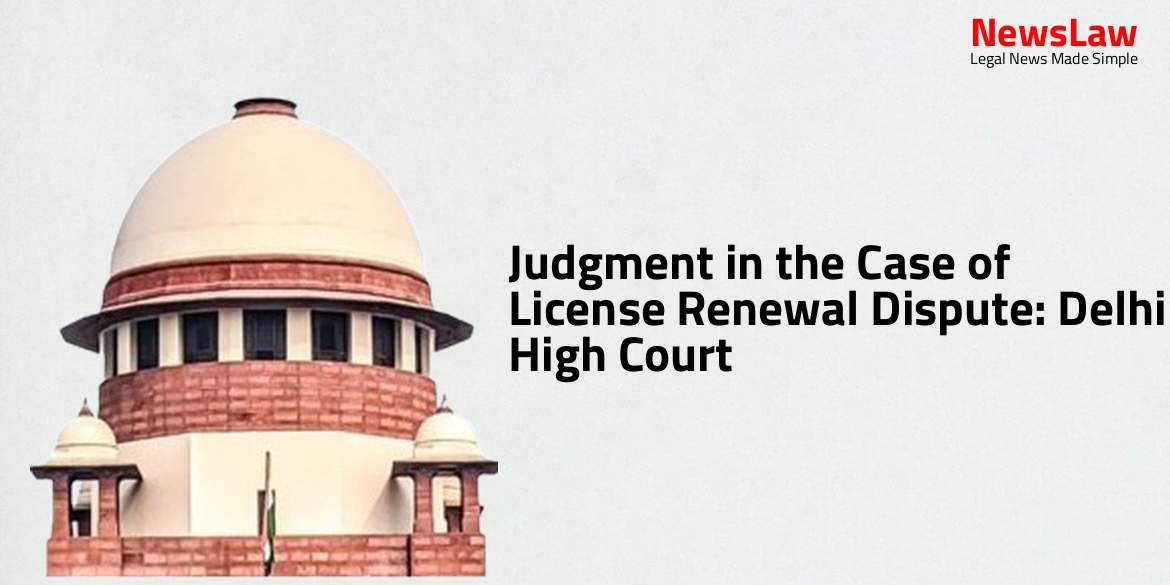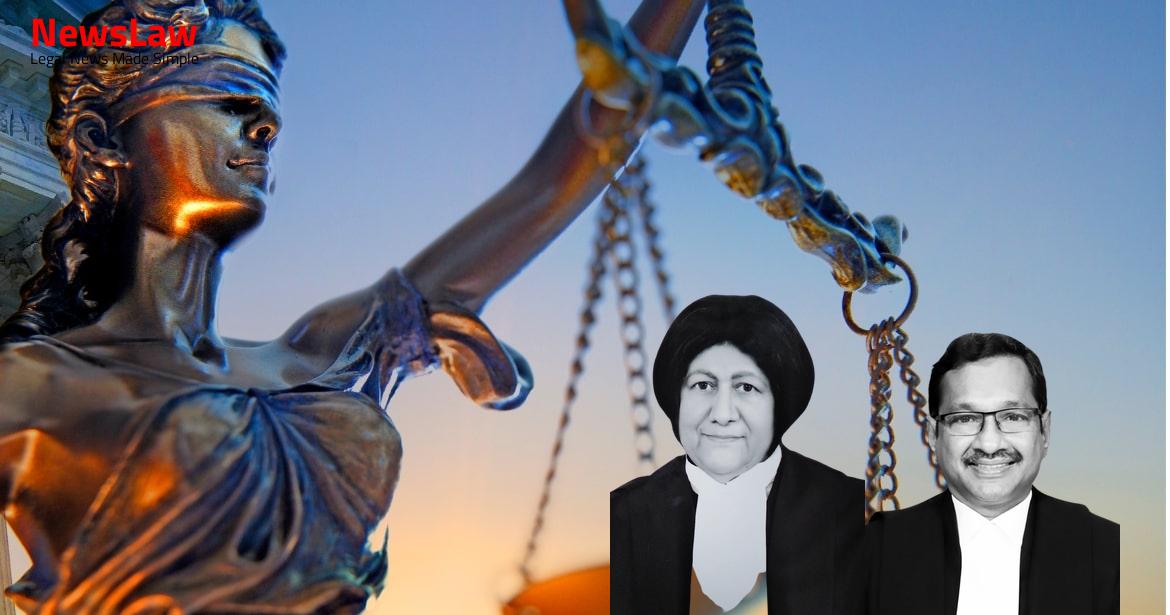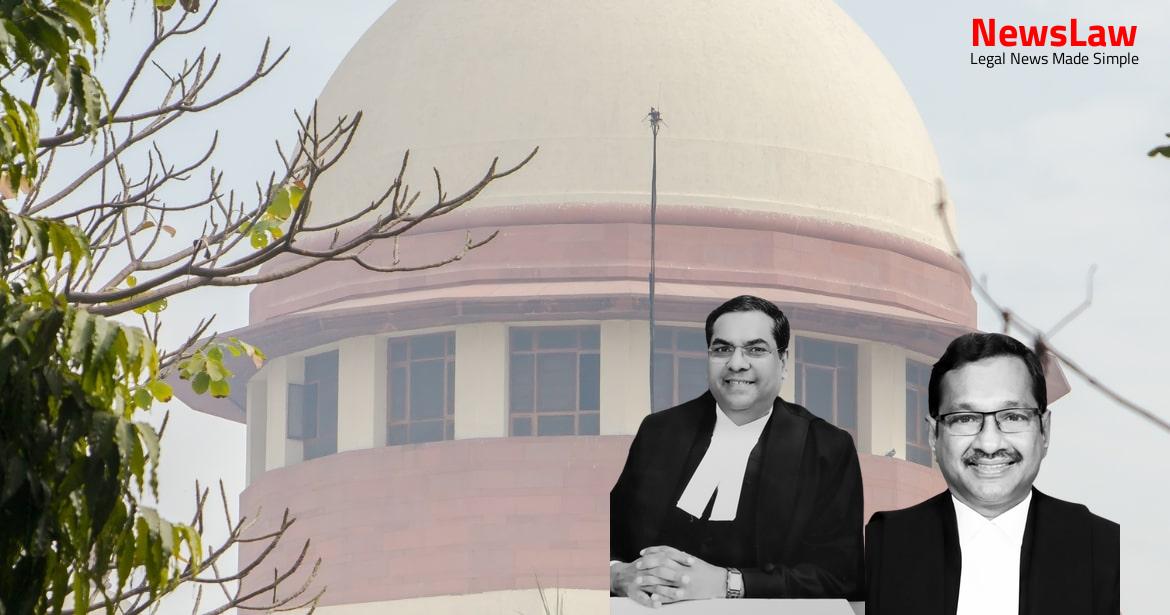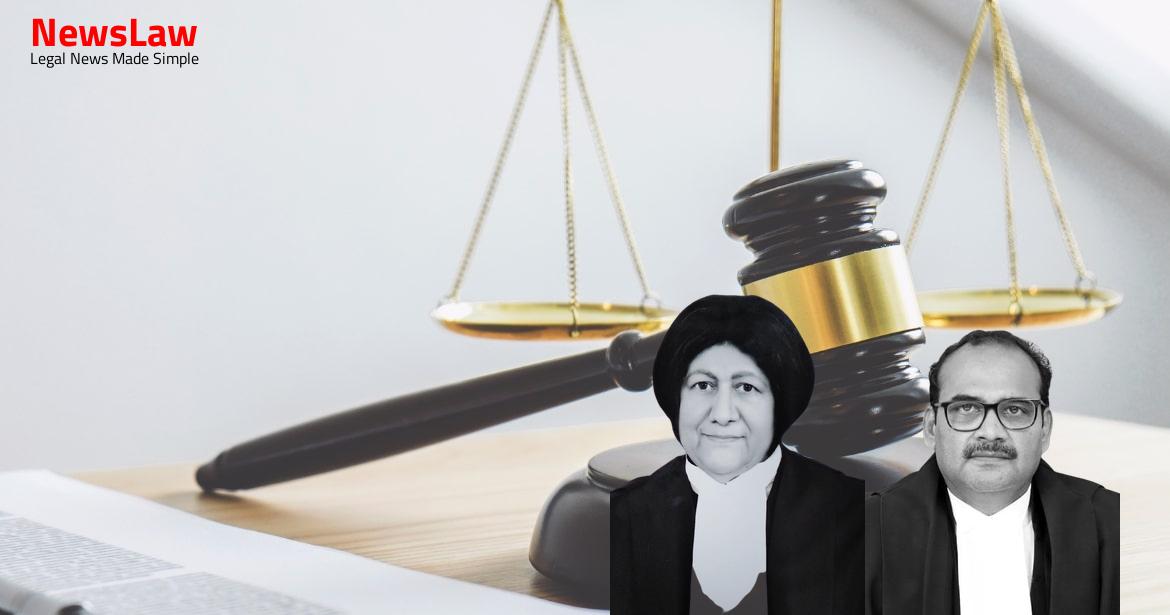The Delhi High Court recently delivered a significant judgment in a case concerning a dispute over the renewal of licenses. The judgment sheds light on the legal complexities surrounding license renewals and sets a precedent for similar cases in the future.
Arguments
- Petitioners claim benefits of a letter dated 21.05.2019 are not valid.
- Petitioners argue that even if a small part of the action arises in Delhi, it should not compel the court to decide on merits.
- Licenses for reserved and general categories follow different re-tendering processes.
- License agreements and Catering Policy 2017 have arbitration clauses.
- Petitioners allege the actions of the respondents to be arbitrary and violating Article 14 of the Constitution.
- Petitioners are accused of not approaching the court with clean hands seeking perpetual license extension.
- Arguments rely on cases like Senior Divisional Commercial Manager v. M. Mohamed Akbar and Rajasthan State Industrial Development & Investment Corpn.
- Petitioners are criticized for vague pleadings of coercion and duress without specific details.
- The Catering Policy 2017 does not allow for license renewal or extension as per South Central Railways (supra).
- Catering Policy 2017 balances between livelihood rights and equal opportunities per Supreme Court sentiments.
- Jurisdiction is questioned based on the situs of the Railway Board issuing the Catering Policy 2017.
- Reliance on cases like Kusum Ingots & Alloys Ltd. v. Union of India, Shiva Industries v. Union of India, and Durgapur Freight Terminal (P) Ltd. v. Union of India for support.
- Catering Policy 2017 prevents monopolization and provides livelihood opportunities at re-tendering.
- Exclusive jurisdiction clauses in license agreements direct disputes to zonal railway headquarters courts.
- Supreme Court opinions on right to livelihood and lack of employment opportunities are referenced.
- Assortment of other legal cases are cited to support various contentions.
- Clarifications made regarding the application of the Catering Policy 2017 in a subsequent letter.
- No fundamental right is claimed to trade at a particular public space, subject to reasonable restrictions.
- Different treatment of vendors during the pandemic is highlighted.
- Arguments against Clause 11 of the Catering Policy 2017 as violative of constitutional rights.
- License agreements are claimed to be signed under coercion and economic duress.
Analysis
- The court has jurisdiction to declare laws unconstitutional.
- The concerned zonal/divisional railways extended license period based on ground realities.
- The railways’ action/policy is not violative of Article 14 of the Constitution.
- Force Majeure clause may be implemented for catering and vending contracts due to lockdown.
- Potential remedy for disputes lies in contract clauses.
- Challenging Clause 11 of the Catering Policy 2017 is within the court’s jurisdiction.
- Petitioners cannot claim a perpetual right to license renewal.
- Clause 11 explicitly states no extension or renewal of Catering units.
- Courts cannot legislate but can mandate policies based on existing laws.
- Policy decisions by railways account for better administration.
- Petitioners seeking license renewal after knowing the terms is not permissible.
- Petitioners’ challenge against Catering Policy 2017 is unfounded.
- Rights of marginalized minorities are safeguarded in the Catering Policy 2017.
- Petitioners participated in tenders with the knowledge of no extension/renewal.
- No entitlement to renewal rights under Easements Act or Catering Policy 2017.
- Public bodies cannot arbitrarily decline license renewals.
- Allegations of coercion or undue influence require specific details to be pleaded.
- Reliance on past extensions for other licensees is not applicable to petitioners.
- A Mandamus cannot be issued to direct enactment of laws or rules.
- Petitioners operating catering units since the initial license grant.
- The question of territorial jurisdiction to entertain a writ petition must be determined based on the averments made in the petition, regardless of their truth.
- The existence of paragraph 1744 of the Indian Railways Commercial Manual is stated as the root cause for the challenged punitive demands.
- Paragraph 1744 is alleged to be in violation of Section 73 and 79 of the Railways Act, 1989, as per the petitioner’s submissions.
- The challenge to paragraph 1744 of the Indian Railways Commercial Manual is acknowledged without delving into its merits.
- The doctrine of estoppel by election is a form of equitable estoppel, emphasizing breach or threat to breach fundamental, statutory, or enforceable equitable rights as essential for a writ of Mandamus.
- The law of estoppel prevents a person from asserting a right contrary to his prior actions or conduct.
- Acceptance of a contract’s terms, even if under unequal bargaining position, does not undermine its validity.
- Contracts, whether by the State or private parties, involve commercial transactions with their own terms.
- Courts interpret laws with a certain creative process, considering uncertainties in executory contracts.
- Policy decisions are judicially reviewed only if they violate fundamental or statutory rights, not for commercial contract disputes.
- Contracts entered through tenders are governed by their terms and related laws, without guarantees of profit or protection from losses by the State.
- A party cannot take contradictory positions, known as ‘approbate and reprobate,’ in contractual matters.
- Tenders are invitations to offer, and participation leads to a contractual agreement with mutual obligations.
- In exceptional cases, a writ may be issued for enforcing equitable rights.
- Individual license agreements and the Catering Policy 2017 contain an arbitration clause for grievances and claims of damages.
- Petitioners are directed to vacate catering units within 3 months for transition to alternative vending arrangements.
- The transition period starts from the extended license period or the date of the judgment, whichever is later.
- Payment of usual license fee is required during this transition period.
- The petitions are dismissed, but rights and remedies of petitioners are kept open.
Decision
- The present petitions are deemed maintainable.
- Renewal of License 14 is approved.
Case Title: RAM KUMAR AGARWAL Vs. UNION OF INDIA & ORS. (2024:DHC:4476)
Case Number: W.P.(C)-3131/2024



